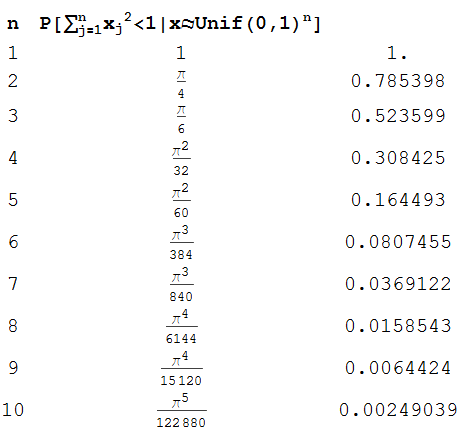This is also not an answer but a brief study in
$Version
"8.0 for Microsoft Windows (64-bit) (October 7, 2011)"
which might be of interest. It considers three methods of calculating the requested probability.
It shows that in this version there is no negative probability but there is still a "critical number" which amounts to 8. For n = 8 the calculation for two methods is not completely performed but the result is returned in the form of commands still to be done.
Method 1
use Probability[] as in the original formulation of the problem
p[n_] := Probability[Sum[a[i]^2, {i, 1, n}] < 1,
Table[a[i], {i, 1, n}] \[Distributed]
UniformDistribution[Array[{0, 1} &, n]]]
Calculate some values and measure time required
{#, Timing[p[#]] // Reverse} & /@ Range[8]
{{1, {1, 0.016}}, {2, {\[Pi]/4, 0.14}}, {3, {\[Pi]/6, 0.265}}, {4, {\[Pi]^2/
32, 1.155}}, {5, {\[Pi]^2/60, 4.789}}, {6, {\[Pi]^3/384, 15.007}},
{7, {\[Pi]^3/840, 34.336}}, {8, {Probability[
a[1]^2 + a[2]^2 + a[3]^2 + a[4]^2 + a[5]^2 + a[6]^2 + a[7]^2 + a[8]^2 <
1, {a[1], a[2], a[3], a[4], a[5], a[6], a[7], a[8]} \[Distributed]
UniformDistribution[{{0, 1}, {0, 1}, {0, 1}, {0, 1}, {0, 1}, {0, 1}, {0,
1}, {0, 1}}]], 836.774}}}
Method 2
use Integrate with Boole
Notice that f(n) = 2^n p(n)
f[n_] := Integrate[Boole[Sum[a[i]^2, {i, 1, n}] < 1], Sequence @@ Table[{a[i], -1, 1}, {i, 1, n}]]
Calculate some values and measure time required
{#, Timing[f[#]] // Reverse} & /@ Range[8]
{{1, {2, 0.015}}, {2, {\[Pi], 0.203}}, {3, {(4 \[Pi])/3,
0.328}}, {4, {\[Pi]^2/2, 1.716}}, {5, {(8 \[Pi]^2)/15,
8.018}}, {6, {\[Pi]^3/6, 32.682}}, {7, {(16 \[Pi]^3)/105,
145.877}}, {8, {(-(4/3))*Pi*Integrate[
Sqrt[-(1/Sqrt[1 - a[1]^2 - a[2]^2 - a[3]^2 - a[4]^2 - a[5]^2])]*
(-Sqrt[1 - a[1]^2 - a[2]^2 - a[3]^2 - a[4]^2 - a[5]^2])^(3/2)*
(1 - a[1]^2 - a[2]^2 - a[3]^2 - a[4]^2 - a[5]^2), {a[1], -1, 1},
{a[2], -Sqrt[1 - a[1]^2], Sqrt[1 - a[1]^2]},
{a[3], -Sqrt[1 - a[1]^2 - a[2]^2], Sqrt[1 - a[1]^2 - a[2]^2]},
{a[4], -Sqrt[1 - a[1]^2 - a[2]^2 - a[3]^2],
Sqrt[1 - a[1]^2 - a[2]^2 - a[3]^2]},
{a[5], -Sqrt[1 - a[1]^2 - a[2]^2 - a[3]^2 - a[4]^2],
Sqrt[1 - a[1]^2 - a[2]^2 - a[3]^2 - a[4]^2]}], 2290.718}}}
Method 3
volume of n-dimensional unit sphere
Exact values up to n=10 are swiftly calculated by this method for reference. Using polar ccordinates (see e.g. http://de.wikipedia.org/wiki/Polarkoordinaten#n-dimensionale_Polarkoordinaten) we have for the volume
v[n_] := Integrate[
r^(n - 1) Product[Sin[u[j]]^j, {j, 1, n - 2}], {r, 0, 1}, {phi, 0, 2 \[Pi]},
Sequence @@ Table[{u[j], 0, \[Pi]}, {j, 1, n - 2}]]
Notice that v(n) = 2^n p(n).
Calculate some values and measure time required
{#, Timing[v[#]] // Reverse} & /@ Range[10]
{{1, {2 \[Pi], 0.}}, {2, {\[Pi], 0.}}, {3, {(4 \[Pi])/3,
0.063}}, {4, {\[Pi]^2/2, 0.14}}, {5, {(8 \[Pi]^2)/15,
0.234}}, {6, {\[Pi]^3/6, 0.375}}, {7, {(16 \[Pi]^3)/105,
0.483}}, {8, {\[Pi]^4/24, 0.702}}, {9, {(32 \[Pi]^4)/945,
2.621}}, {10, {\[Pi]^5/120, 4.103}}}
I have checked that there were no memory shortages on my PC. Hence there must be an intrisic reason in MMA for magic number 8.
Regards,
Wolfgang




Pi^3/840, which is correct. Version 9.0.1 has been working for much longer than 8.0.4 and finally returned-Pi^3/840, which looks to be a bug (possibly in the symbolic intergration code). $\endgroup$\[Pi]^3/840. $\endgroup$Integrate[Boole[a^2 + b^2 + c^2 + d^2 + e^2 + f^2 + g^2 < 1], {a, -1, 1}, {b, -1, 1}, {c, -1, 1}, {d, -1, 1}, {e, -1, 1}, {f, -1, 1}, {g, -1, 1}]also gives a wrong result: it has an extra minus sign. (Somehow I though that extending the integration domain would help...) $\endgroup$